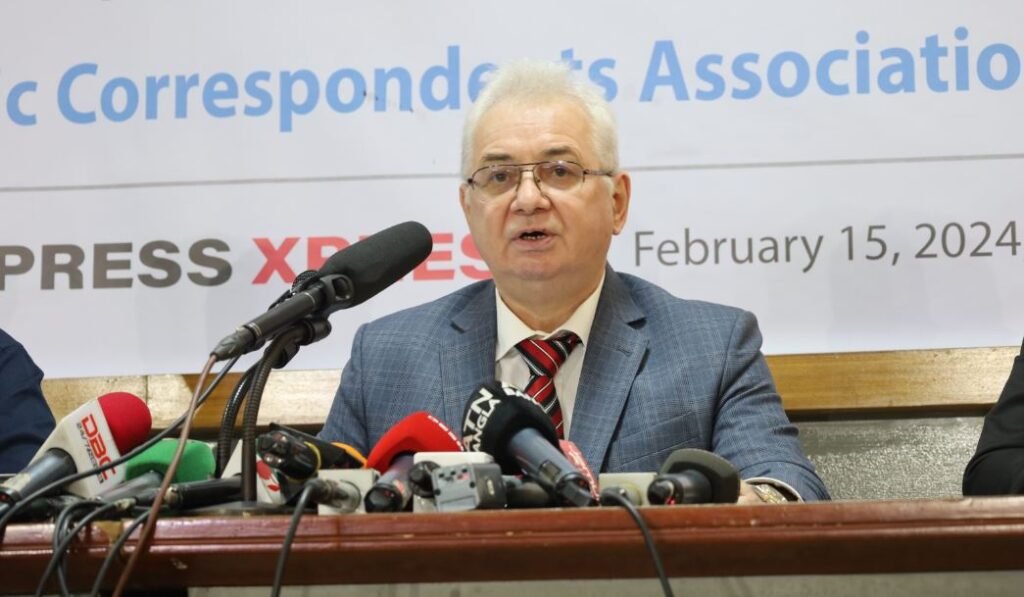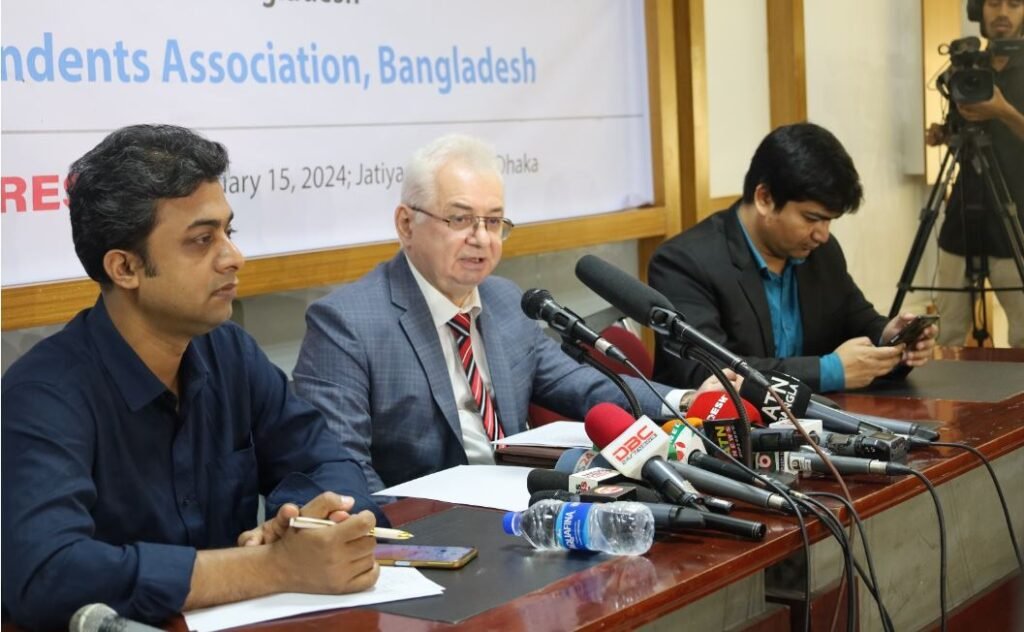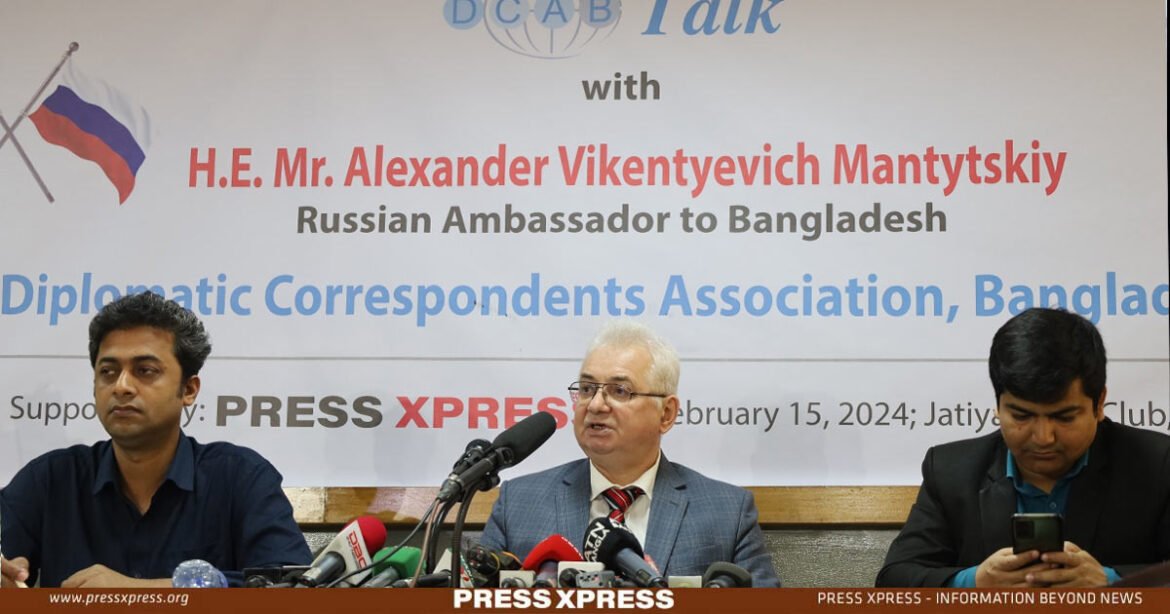On Thursday, February 15th, the “DCAB Talk with H.E. Alexander Mantytskiy,” featuring the esteemed Russian Ambassador to Bangladesh, took place at 11 AM at the Tofazzal Hossain Manik Mia, National Press Club in the capital.
The discussion at the event encompassed topics such as Russia’s foreign policy, its bilateral relations with the West and Bangladesh, as well as its development initiatives in Bangladesh, including the Rooppur nuclear power plant and how media disseminates false information. Furthermore, the conversation touched upon the Russia-Ukraine war, Israel Palestine conflict, and other pertinent issues.
YOU CAN ALSO READ: RUSSIA PROPOSES EXPORTING WHEAT TO BANGLADESH, EXPLORES EXPANDING BILATERAL TRADE
President of DCAB Nurul Islam Hasib presided over the event and delivered a comprehensive introduction to the Ambassador. He highlighted Ambassador Mantytskiy’s extensive diplomatic experience, which includes service in India, Nepal, and Afghanistan since 1984, in addition to his role representing Russia.
DCAB General Secretary Ashiq Rahman Topu also attended the event.
Key Takeaways from the Event
Alexander began discussing Russia’s foreign policy, which focuses on developing relations with countries willing to engage in mutually beneficial dialogues to maintain a balance of interests. Russia has made efforts to improve relations worldwide, including with neighboring countries, as well as in the Asia-Pacific, Middle East, Africa, and Latin America regions.

He then shifted to the Israel-Palestine conflict, stating that Russia believes the Hamas attack on October 7th, 2023, was a holy condemnation. Russia emphasizes that this conflict cannot be resolved militarily; instead, it requires political and diplomatic resolutions through a fully recognized negotiation process, leading to the establishment of an independent Palestinian state.
The Ambassador further said that a significant milestone in BRICS development was the inclusion of new members such as Iran, the United Arab Emirates, Saudi Arabia, and Ethiopia. Russia assumed the BRICS chairmanship in January and intends to give special attention to the new members to ensure their positive contributions to the global community.
He highlighted “During the Russian chairmanship, the Eurasian Economic Union adopted a declaration outlining its development plans until 2030 and 2045. The organization also signed a free trade agreement with Iran and Myanmar. In 2024, the organization aims, among other things, to foster a systemic dialogue with the Shanghai Cooperation Organization, ASEAN, BRICS countries, and others.
Russia-China relationship reached an unprecedented level in 2023. After the re-election of the People’s Republic of China, Xi Jinping made his first foreign visit to Russia in March. President of Russia Vladimir Putin visited China for the third Belt and Road international forum in October. The bilateral trade touched another record high of more than $230 billion”.
Speaking about economic cooperation, Mantytskiy said “Bangladesh remains Russia’s second-largest trading partner in South Asia after India. In January 2023, the trade volume amounted to $2.3 billion. During this time, Bangladesh’s exports reached approximately $800 million, with the majority comprising ready-made garments.
In 2023, Bangladesh imported nearly 2.7 million tons of grain from Russia. Russia is prepared to purchase potatoes, mangoes, and various other agricultural products from Bangladesh. Energy serves as the backbone of cooperation between Bangladesh and Russia. Gazprom has continued its projects in Bangladesh to ensure energy security. The construction of three wells on Bhola Island has been completed, bringing the total number of drilled wells to 20. The company has proposed the evacuation and exploration of new fields, which are currently under consideration.
The Rooppur project is moving according to the schedule and there is an installation of the passive heat removal system in unit 2 is among the recent milestones. The first unit is expected to start pilot operation by the end of this year.”

Talking about the Russia-Ukraine war he said, “In 2022 an agreement was reached between the two countries and negotiations took place to stop the war which was initiated by Russia. It comes as a surprise to read in certain local newspapers reprinted articles from Western media on the so-called indiscriminate Russian shelling of densely populated areas in Ukraine causing civilian losses. I would like to state once again that the Russian military targets only military facilities often disguised as civilians. On the contrary, Ukrainians have been increasingly and purposefully shelling residential buildings, schools, kindergartens, markets, and medical facilities in Russia. Belgorod region and Donbas experience around 2000 attacks on civilian objects every week. Unfortunately, these actions hardly find any mention in Bangladesh media.”
A question was asked from Press Xpress on possibility of Russia providing preferential prices on oil and petrol to Bangladesh, as the nation was already providing a deal to India.
The Ambassador replied to Press Xpress, “Much depends on negotiations! Almost one and half years ago, Russia had given a proposal to your government for supply of oil. Unfortunately, till now, there was no direct negotiations in your government and our companies.”
“Of course, there is possibility of such collaborations but it should be negotiable. Every negotiation is possible!” he added.
The event concluded with a questionnaire session between the Ambassador and journalists from various media outlets.
When asked by a journalist about the potential for Bangladesh and Russia to engage in currency exchange using the ruble to de-dollarize, Alexander responded “Discussions are going on between the Central Bank of Russia and the Bangladesh Bank. Yes, there’s a possibility of trading but not in rubles, not in dollars, not in euros but in some other currencies. Discussions are going on when the time will arrive. The declarations will be made by the Russian and Bangladeshi authorities.”


